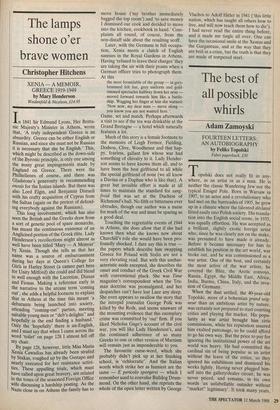The lamps shone o'er brave women
Christopher Hitchens
XENIA — A MEMOIR, GREECE 1919-1949 by Mary Henderson
Weidenfeld & Nicolson, £14.95
In 1841 Sir Edmund Lyons, Her Britta- Inc Majesty's Minister in Athens, wrote that, 'A truly independent Greece is an absurdity. Greece can be either English or Russian, and since she must not be Russian it is necessary that she be English.' This, which might be described as the down-side of the Byronic principle, is only one among the many great impingements made by England on Greece. There were the Philhellenes of course, and there was Gladstone's generosity in recommending enosis for the Ionian islands. But there was also Lord Elgin, and Benjamin Disraeli with his crafty acquisition of Cyprus from the Sultan (again on the pretext of defend- ing everybody against the Russians). This long involvement, which has also seen the British and the Greeks draw from a sort of genetic pool of spare monarchs, has meant the continuous existence of an Anglicised portion of the Greek elite. Lady Henderson's recollections might almost as well have been titled 'Mary — A Memoir' by Xenia. Though she tells us that her name was a source of embarrassment during her days at Queen's College for Girls in Harley Street (a cameo part here for Unity Mitford) she could and did blend in well enough with the Lucretias, Dianas and Fionas. Making a reference early in the narrative to the arcane term 'coming out', she adds a helpful footnote to explain that in Athens at the time this meant 'a debutante being launched into society, attending "coming-out" parties, meeting suitable young men or "deb's delights" and hopefully in the end finding a husband.' Only the 'hopefully' there is un-English, and I must say that when I came across the word 'toilet' on page 128 I almost fell off my chair. By page 128, however, little Miss Maria Xenia Cawadias has already been strafed by Stukas, roughed up by the Gestapo and nearly executed for her resistance activi- ties. These appalling trials, which must have called upon great bravery, are related in the tones of the seasoned Foreign Office Wife discussing a hardship posting. As the Nazis close in on Athens the family has to move house ('m), brother immediately bagged the top room') and `to save money I dismissed our cook and decided to move into the kitchen, cookbook in hand.' Com- plaints all round, of course, from the non-distaff side about the resulting scoff.
Later, with the Germans in full occupa- tion, Xenia meets a clutch of English nannies in the Royal Gardens in Athens. Having 'refused to leave their charges' they are taking the air with their prams when a German officer tries to photograph them. At this
the most formidable of the group — in grey- brimmed felt hat, grey uniform and gold- rimmed spectacles halfway down her nose — moved forward towards him like a battle- ship. Wagging her finger at him she warned: 'Now now, my dear man — move along — you know you are not wanted here.'
Game, set and match. Perhaps afterwards a visit to see if the tea was drinkable at the Grand Bretagne — a hotel which naturally features a lot.
Much of this story is a female footnote to the memoirs of Leigh Fermor, Fielding, Dodson, Clive, Woodhouse and that hap- py, fearless, gallant few whose war had something of chivalry to it. Lady Hender- son seems to have known them all, and to have been the best girlfriend to all while the special girlfriend of none (we all know a Davina or a Daphne who is like that). A great but invisible effort is made at all times to maintain the standard for sang- froid that was set at the Duchess of Richmond's ball. No filth or bitterness ever obtrudes, though our author was a nurse for much of the war and must be sparing us a good deal.
Touching the regrettable events of 1944 in Athens, she does allow that if she had known then what she knows now about Churchill's role she would have been pro- foundly shocked. I dare say this is true — the papers which describe him swapping Greece for Poland with Stalin are not a very elevating read. But with this unchar- acteristic aside excepted, she describes the onset and conduct of the Greek Civil War with conventional pluck. She was Time magazine's correspondent when the Tru- man doctrine was promulgated, and her despatches can't have lost Luce any sleep. She even appears to swallow the story that the intrepid journalist George Polk was killed by the Reds, and seems unaware of the mounting evidence that this exemplary crime was committed by 'our' firm. If you liked Nicholas Gage's account of the civil war, you will like Lady Henderson's, and the continued adherence of so many Greeks to one or other version of Marxism will remain just as imponderable to you.
The favourite curse-word, which she probably didn't pick up at her finishing school, is 'ochlocratic'. And the Italian words which strike her as funniest are the same — E pericolo sporgersi — which I remember used to convulse Bulldog Drum- mond. On the other hand, she reprints the whole of the open letter written by George Vlachos to Adolf Hitler in 1941 ('this little nation, which has taught all others how to live, and will now teach them how to die'). I had never read the entire thing before, and it made me tingle all over. One can have the occasional smile at the Xenias and the Gargantuas, and at the way that they are brill in a crisis, but the truth is that they are made of tempered steel.


















































 Previous page
Previous page